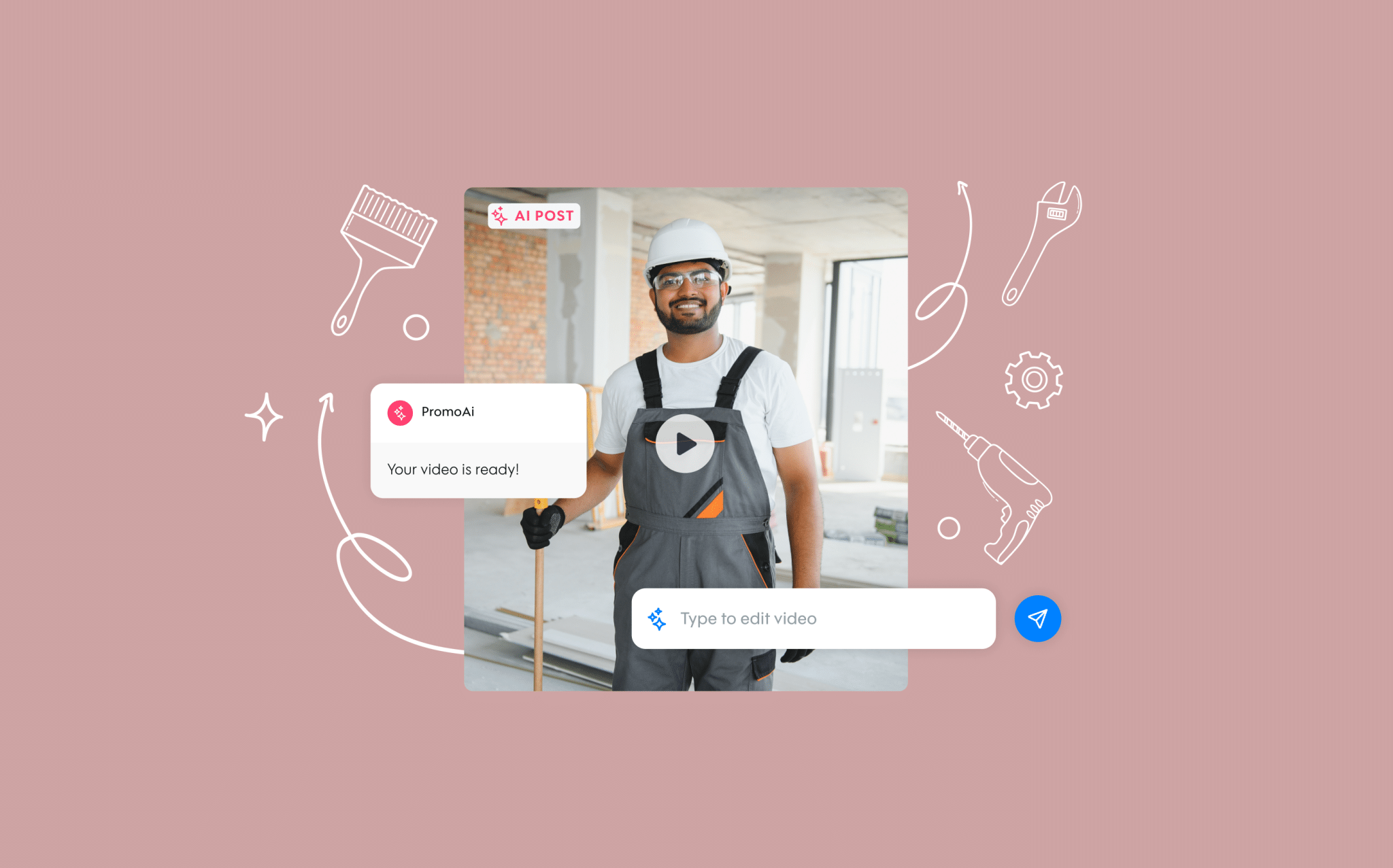
AI for the Modern Builder: Transforming Renovation, HVAC, Landscaping, and Inspections

- Blog
- Small Business Tips
- AI for the Modern Builder: Transforming Renovation, HVAC, Landscaping, and Inspections
The construction industry is no exception to the rapid evolution that artificial intelligence (AI) is ushering in. AI technology is no longer just for big corporations; it’s making a significant impact on small and medium-sized businesses in the home construction sector.
In fact, AI in construction could boost productivity by 50% and reduce accidents on construction sites by 20%, making it not only a tool for efficiency but also for enhancing safety. As AI continues to develop, the opportunities for home construction businesses to leverage this technology are expanding rapidly.
Let’s explore how AI can revolutionize the way home construction businesses operate, from planning and design to project management and beyond.
The Rise of AI in Home Construction
AI in construction first gained traction with the introduction of robotics and AI-driven tools designed to improve efficiency in tasks like material optimization and design automation. Early applications focused on automating repetitive tasks, helping contractors and builders improve precision and reduce human error. As AI capabilities advanced, it quickly became clear that AI could transform more than just individual tasks — it could overhaul the entire construction process from start to finish.
Today, AI is a critical component in construction design and planning. AI-powered 3D modeling tools can now generate detailed models from 2D plans, allowing architects, builders, and clients to visualize projects more effectively. These models can be further enhanced with immersive virtual reality (VR) walkthroughs, giving clients a true sense of what their finished homes will look like before a single brick is laid.
AI has also become indispensable in project monitoring and cost estimation. Real-time AI tools track project progress, predict delays, and offer cost-saving solutions by analyzing data on materials, labor, and potential risks. This predictive capability helps construction businesses stay on schedule and within budget, ensuring smoother operations.
he growth of AI-driven takeoff automation, scheduling, and predictive analytics has further solidified AI’s role in modern construction. Automated takeoff tools streamline the estimation process by calculating materials, labor, and costs in a fraction of the time it would take manually. AI-powered scheduling systems predict potential delays due to weather, supply chain disruptions, or labor shortages, allowing businesses to adjust timelines proactively.
Today, AI in home construction is helping businesses not only enhance operational efficiency but also improve safety, reduce costs, and deliver projects with greater precision. With further advancements on the horizon, AI will continue to shape the future of home construction.
Applications of AI for Home Construction Businesses
As we discussed above, AI has the potential to revolutionize various aspects of home construction businesses, helping companies streamline operations, improve quality, and enhance client satisfaction. Below are some of the key applications of AI in home construction.
Marketing and Social Media
In the competitive construction industry, effective marketing and social media presence are critical for attracting new clients and growing brand visibility, especially for small and medium-sized businesses. With approximately 96% of people discovering local businesses online, the need for a strong digital marketing strategy is clear.
AI can automate the creation of compelling marketing campaigns, social media posts, and promotional videos tailored to your brand’s aesthetic. These tools analyze trends and audience engagement data to suggest relevant, timely content, allowing home construction businesses to stay active on platforms like Instagram, Facebook, and YouTube.
Recommended Tools: PromoAI helps home construction businesses easily create, schedule, and publish AI-generated marketing content, including videos, ads, and social media posts that resonate with target audiences.
Design and Planning
The quality of design and planning significantly differentiates homebuilders, impacting customer satisfaction and brand reputation. Moreover, efficient design planning is essential for keeping projects on track and within budget.
AI tools streamline the design process, making it faster, more accurate, and responsive to client needs. AI-powered generative design optimizes space utilization, helping architects and contractors explore multiple design options quickly. AI-enhanced 3D models and VR walkthroughs improve client satisfaction by allowing them to visualize their project in detail before construction begins.
Recommended Tools: SketchUp offers AI-driven design solutions, providing accurate 3D models and facilitating easier collaboration between designers and clients.
Project Management and Scheduling
Effective project management can lead to significant cost savings and improved timelines, with companies that excel in this area often seeing higher client retention rates due to successful project completions. This means that managing time and resources efficiently is crucial to avoid costly delays and errors in home construction projects.
AI-driven predictive analytics analyze project data to forecast potential delays, optimize resource allocation, and suggest time-saving strategies. Automated scheduling tools ensure projects run smoothly by adjusting timelines based on weather, material availability, or workforce changes. Real-time tracking provides managers with up-to-date information on project progress.
Recommended Tools: Procore and Buildertrend are powerful AI-powered project management tools that help construction businesses automate scheduling and monitor real-time project developments.
Quality Control and Automated Inspections
As construction costs rise due to material shortage, implementing automated inspections can reduce costs associated with manual checks and improve overall project quality. And, of course, compliance with building codes and standards is essential for avoiding costly legal issues.
AI-powered image recognition can detect defects or deviations from plans early in the construction process, allowing teams to correct issues before they escalate. Automated inspection tools generate detailed reports on construction quality, streamlining documentation and reducing the likelihood of human error.
Recommended Tools: OpenSpace uses AI to ensure high-quality construction through automated inspections and real-time reporting.
Safety and Risk Mitigation
In an industry where 1 in 10 workers are injured each year, ensuring a safe work environment on construction sites is a top priority. Thankfully, AI can help reduce risks and prevent accidents.
AI-driven hazard detection uses computer vision to identify potential risks on-site in real-time. Predictive maintenance systems forecast equipment failures, reducing downtime and improving operational safety. Wearable AI devices monitor worker health and safety, alerting supervisors to potential hazards or health risks.
Recommended Tools: Saifety.ai is an AI-enabled safety management platform for the construction industry, ensuring a safe environment at any construction site
Client Communication and Personalization
Clients are the heart of a successful home construction business, with effective communication with building trust and ensuring smooth project execution. AI tools make communication more personalized and efficient for a better client experience.
AI-powered chatbots provide instant responses to client inquiries, freeing up time for human staff. Personalized recommendations based on client preferences improve customer satisfaction. Digital twins of projects allow clients to visualize updates and manage future renovations or maintenance.
Recommended Tools: AI Automated Solutions offers AI tools for improving client communication and project transparency through chatbots and digital twin technology.
Sustainability and Energy Efficiency
AI helps reduce the environmental impact of home construction projects by promoting sustainable practices and optimizing energy use. End consumers are showing a growing preference for sustainable building practices.
AI analyzes factors like local climate and building orientation to recommend energy-efficient designs. It can also suggest sustainable materials and optimize material usage to reduce waste, helping construction businesses meet their sustainability goals.
Recommended Tools: Cove.tool helps construction companies design sustainable buildings, offering AI-driven recommendations for energy efficiency and environmentally friendly materials
Applications of AI for Different Home Construction Specialties
No matter what your area of expertise is within the home construction industry, AI can help you enhance your services, increase efficiency, and deliver higher-quality results in your specific niche. Here are some key applications across different specialties.
Renovation and Remodeling Companies
AI helps renovation and remodeling companies offer clients a clear vision of the final outcome before work begins, enhancing decision-making and customer satisfaction.
Renovation and remodeling businesses can use AI to:
- Create realistic project simulations, allowing clients to visualize before-and-after scenarios
- Offer accurate cost estimations, helping clients understand the financial implications
- Assist with material selection, ensuring the best choices for both functionality and aesthetics.
HVAC and Specialized Contractors
Managing complex systems like HVAC requires precision and optimization, which AI can provide to improve both design and maintenance processes.
HVAC and specialized contractors can use AI to:
- Enhance HVAC systems by forecasting potential issues and recommending smart maintenance schedules
- Design more energy-efficient HVAC solutions by analyzing building layouts, occupancy, and energy consumption patterns, reducing costs and environmental impact
Landscaping and Outdoor Construction
Outdoor construction projects are subject to environmental variables, and AI can assist with customized designs that account for these factors, leading to better outcomes.
Landscaping and outdoor construction businesses can use AI to:
- Help create landscape designs optimized for local climates, ensuring plant selections are suitable for the environment
- Enhance the efficiency of irrigation systems by predicting watering needs based on weather patterns, soil conditions, and plant types, helping to conserve water and maintain healthy landscapes
Home Inspection Services
Accurate and efficient home inspections are critical for identifying issues early. AI improves the precision and speed of inspections, giving contractors and clients peace of mind.
Home inspection businesses can use AI to:
- Quickly identify defects and potential issues that might be missed by human inspectors
- Simplify documentation with automated reporting, making it easier to present findings to clients
- Prevent future problems and ensures high standards in home construction by flagging issues early
Best Practices for Implementing AI in Home Construction
Using AI in home construction offers significant advantages, but to unlock its full potential, it’s essential to apply it strategically. Here are some best practices for implementing AI in home construction:
1. Integrate AI Gradually
When adopting AI, start with one or two key areas that can benefit most from automation or data-driven insights, such as scheduling or quality control. Gradually expand AI use as your team becomes more comfortable with the technology.
Tip: Begin by implementing AI for marketing or customer communication, and once the system proves effective, scale up to other areas like design or safety monitoring.
2. Use AI to Support, Not Replace, Human Expertise
While AI can analyze data and automate processes, human oversight is still crucial, especially in creative and decision-making areas. AI should be viewed as a tool to enhance human performance, not replace it.
Tip: Combine AI’s efficiency with the hands-on expertise of your staff to make informed decisions. For example, use AI-driven models for design, but involve architects or builders to make the final creative choices.
3. Prioritize Safety and Compliance
AI can significantly reduce risks, but it’s important to use these tools in conjunction with strong safety practices. AI should augment safety protocols by identifying hazards and preventing accidents, not be a substitute for enforcing on-site safety regulations.
Tip: Implement AI tools that enhance, but do not replace, safety protocols. Regularly review AI-generated safety reports and ensure human supervisors monitor compliance and take action when risks are detected.
Embracing AI for a Smarter Construction Future
AI is revolutionizing the home construction industry by making processes more efficient, improving safety, and enhancing customer experiences. For smaller construction businesses, AI provides an opportunity to streamline everything from design and planning to project management and safety monitoring. With tools that allow for predictive scheduling, automated inspections, and immersive client communication, businesses can take on more projects, reduce errors, and deliver higher-quality results.
Now is the time for home construction businesses to explore the transformative potential of AI. Whether it’s using AI to visualize renovations, optimize project timelines, or enhance client communication, embracing these tools will set your business apart in an increasingly competitive market.
Ready to streamline your marketing efforts? Try PromoAI to create professional, AI-driven content that connects with your audience and helps your construction business thrive.
Meet PromoAI
Generate a month worth of video content for your business in just one click!
About the author
Daisy Rogozinsky
Daisy Rogozinsky loves to use the written word to educate, entertain, and tell stories. If she's not writing content, she's writing poetry, music, and screenplays.


